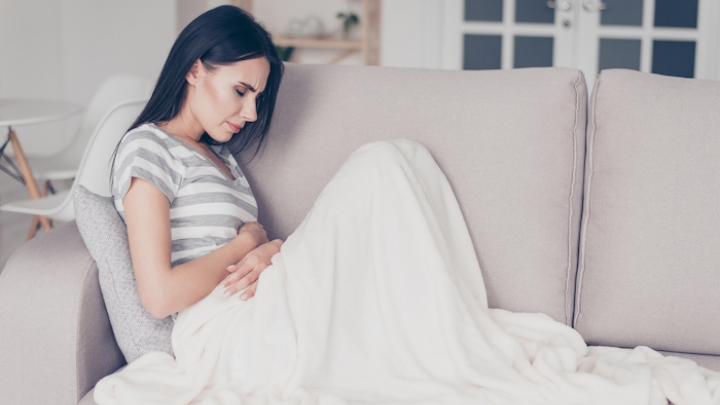(RxWiki News) Despite decades of scientific research, there's still no agreement about what causes premenstrual syndrome (PMS). If you have severe PMS, here are some points to consider.
Premenstrual symptoms can be difficult to treat. Most menstruating women experience one or more premenstrual symptoms, including:
- Breast tenderness
- Bloating
- Headaches
- Fatigue
- Mood swings
For most women, the symptoms are mild and manageable. However, it’s estimated that in 5% to 10% of women the symptoms are severe enough that they have what’s known as premenstrual syndrome, or PMS. Symptoms may also include:
- Insomnia
- Aggressive and violent feelings
- An inability to concentrate on work or study or even to take part in family life
PMS was named in 1953 by Dr. Katharina Dalton, a British physician who claimed that progesterone treatments would cure it (they don’t). She was instrumental in defining it as a disease, blaming PMS for female suicide and some violent crimes. Not everybody thinks this was a positive step.
Despite decades of scientific research, there’s still no agreement about what causes PMS. Theories run from nutritional deficiencies and hormonal irregularities to underlying emotional disorders. There are no tests for the condition. Scores of remedies and treatments have been proposed and tried. Women with severe PMS are "a neglected group for whom the evidence for conventional therapy is sparse and controversial," according to Dr. C. L. Domoney, a noted British gynecologist. The evidence for alternative therapies is even more controversial.
If you have severe premenstrual symptoms, here are some points to consider.
- Many women find that a program of aerobic exercise, such as brisk walking or cycling, lessens PMS symptoms.
- Many women attest to the value of reducing emotional stress.
- This is easier said than done if you have family problems, a job you dislike, or health problems.
- But you can try yoga, tai chi, deep breathing techniques, and/or meditation, if these appeal to you.
- Set aside time for relaxation each day.
- There’s preliminary evidence that calcium reduces symptoms.
- Some doctors advise getting 1,000 to 1,200 milligrams of calcium daily from supplements. That’s the amount all women should aim for, anyway.
- A few years ago a study found that diets rich in calcium and vitamin D help reduce symptoms.
- Vitamin B6, widely touted, has not been shown to be of any value for PMS.
- Some women say it helps to limit caffeine or sodium. But no research has found that caffeine is to blame for PMS, or that salt causes bloating or has any effect on PMS.
- Progesterone treatments don’t help, according to most evidence. This is true whether the progesterone is natural or synthetic, administered orally or as suppositories.
- Be wary of herbal supplements.
- Many herbs (evening primrose oil, chasteberry, ginkgo biloba, black cohosh, St. John’s wort, and others) are touted for relief of PMS.
- There’s no convincing evidence they help.
Other therapies
Here are some other ways to address menstrual discomfort.
- Aspirin and over-the-counter pain relievers such as ibuprofen (such as Advil or Motrin) and naproxen (Aleve) may help.
- Start one of these pain relievers seven days before your period and continue for four days after it starts.
- You can also try acetaminophen (such as Tylenol).
- We don’t recommend Midol and other tablets marketed especially for PMS, which usually contain a pain reliever, diuretic, and antihistamine. The last two are useless for PMS symptoms.
- Some of these PMS pills are simply overpriced pain relievers.
- Prescription antidepressants such as fluoxetine (Prozac or Sarafem) and sertraline (Zoloft) may reduce PMS symptoms.
- Sarafem, approved for PMS symptoms, is actually just Prozac.
- Talk with your doctor about these drugs.
- They may help relieve the depression and anxiety that are often part of severe PMS.
- Oral contraceptives, which depress ovulation, seem helpful for some women, though the evidence is not clear.
- Drospirenone has been found in some studies to reduce PMS symptoms. It combines estrogen with a special type of progesterone.
- Women with migraines, diabetes, blood clotting, or a history of heart disease are advised not to take oral contraceptives.
Clinical note
PMS clinics have sprung up all over. But if you decide to try one, make sure it is run by a reputable gynecologist or primary-care doctor. Ask a doctor you trust for a recommendation.
A PMS clinic should offer psychiatric counseling or referrals to it, if need be, and should tailor the treatment to the patient. It is not a good sign if a clinic pushes a single treatment for all women, promises a quick fix, or requires expensive lab work or payment in advance.

